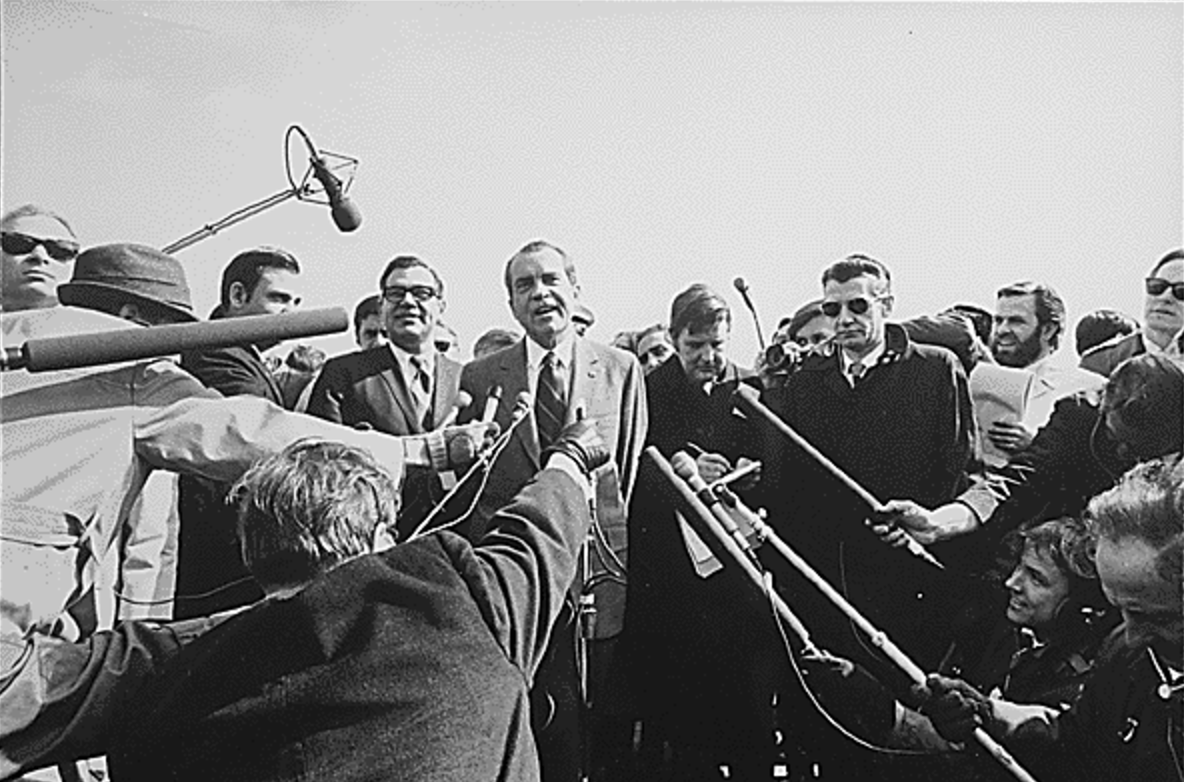Richard Nixon, the 37th President of the United States, was born on January 9, 1913 in Yorba Linda, California. Serving as the Vice President under Dwight D. Eisenhower, Nixon remained in the public eye and the political sphere for close to twenty years. He lost to John F. Kennedy in the 1960 election but returned to Washington eight years later and won the 1968 election. Nixon ran on a campaign that was severely anti-communist. He served as a member of the House Un-American Activities Committee from 1948 until 1950, and was able to bring Alger Hiss, a former State Department official, to the witness stand where Hiss admitted that he, in fact, had contact with the Soviet Union.
Nixon’s strong anti-communist background made him the perfect candidate for vice president under Eisenhower, who needed support in the west. Even so, in 1952 the New York Post reported that Nixon had a private fund provided by campaign donors. In an address in September, just two months before the election, Nixon addressed the American public, admitting that the fund did in fact exist, though he had never used the funds improperly. This report by the New York Post began Nixon’s war on the media almost twenty years before he was even president.
The biggest hallmark of his presidency was the Watergate scandal. The scandal was put in motion by the leak of “The Pentagon Papers” in 1971. The New York Times published an excerpt detailing Vietnam policy during John F. Kennedy and Lyndon B. Johnson’s presidencies. The leak came from former Department of Defense worker Daniel Ellsberg. Even though the papers did not mention Nixon’s administration, he was enraged. As a result of this leak and other press leaks that had plagued Nixon during his presidency, he created a group of anti-leak operatives called the Plumbers. They burglarized the office of Ellsberg’s psychiatrist to try and find evidence that would discredit him, but they found nothing. Shortly after the burglary, the group disbanded and the Committee to Re-elect the President was formed. In May of 1972, members of the Committee broke into the Democratic National Committee’s headquarters in the Watergate Hotel, stole copies of top-secret documents and bugged the office’s phones. The wiretaps failed to work, so the group returned on June 17, 1972 and were apprehended by the police in an attempted burglary.
Nixon did not authorize the burglary, and there is debate about whether he knew about it beforehand, but he feared that if the break-in was connected to his administration he would lose reelection. The Nixon White House paid hundreds of thousands of dollars in “hush money” to the burglars. Nixon also instructed the Central Intelligence Agency (CIA) to hinder the Federal Bureau of Investigation’s (FBI) investigation of the burglary. He gave a speech in August swearing that he was not involved in the break-in, and the people believed him.
That following November, Nixon was re-elected for another term as president. However, after he was re-elected the scandal began to unravel. Some of Nixon’s White House aides testified before a grand jury about his crimes, revealing that Nixon had secretly taped every conversation that took place in the Oval Office. Prosecutors wanted the tapes in order to prove Nixon’s guilt, but he refused to hand them over. Special prosecutor Archibald Cox, along with Senate investigators, demanded possession of the tapes. When Cox refused to stop his demands, Nixon fired him, causing outrage within the Justice Department and among the public.
Many Americans wrote letters to Congress demanding his impeachment. Nixon announced the release of edited transcripts of the tapes, which enraged the people and the media, thus strengthening their call for his impeachment. After the Supreme Court ordered that Nixon turn over the tapes, the House Judiciary Committee recommended that Nixon be impeached. On August 5, Nixon finally released the tapes which demonstrated his involvement in the cover-up. Three days later on August 8, Nixon became the first US president to resign.
The media played a significant role in the end of Nixon’s presidency. They held him accountable for his actions and would not allow him to abuse his power. The media investigated the scandal and some of the first people to become suspicious about Nixon’s involvement in Watergate were Washington Post reporters Carl Bernstein and Bob Woodward. The two young reporters started out investigating the burglary, and ended up exposing Nixon along with forty White House and administration officials. Without them the scandal may have never unraveled, and Nixon may have never have been held accountable.




































